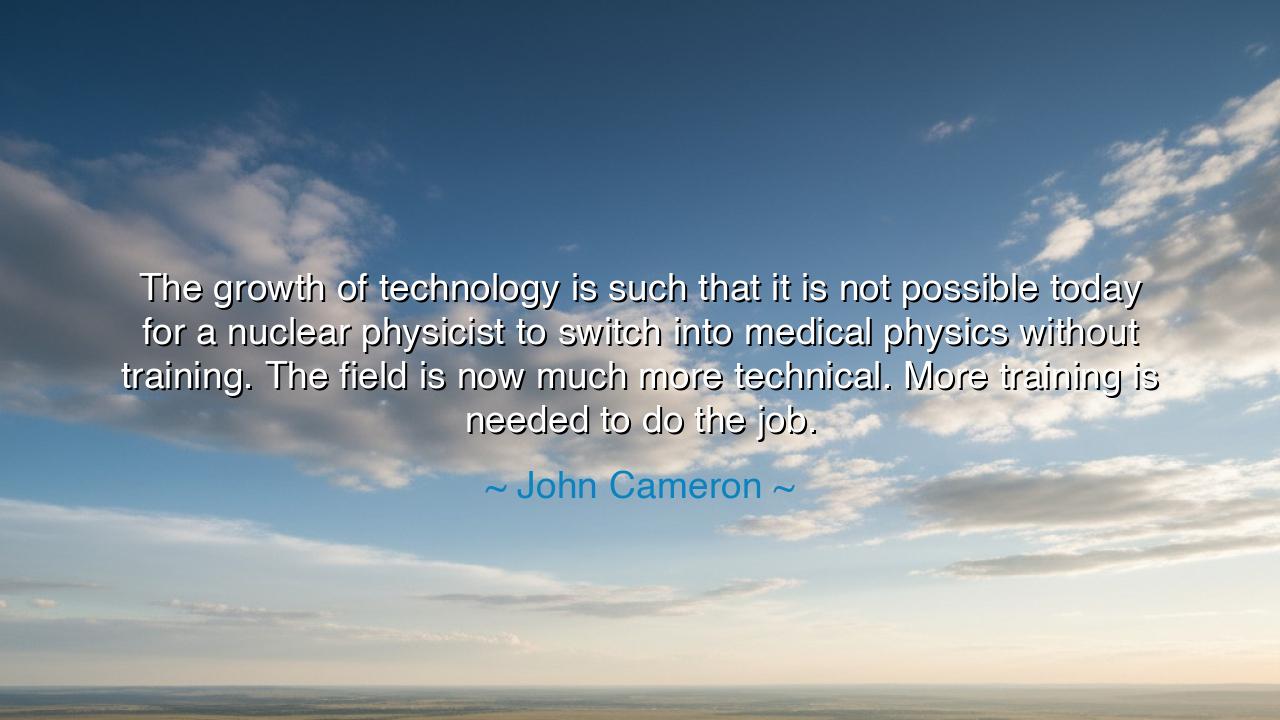
The growth of technology is such that it is not possible today
The growth of technology is such that it is not possible today for a nuclear physicist to switch into medical physics without training. The field is now much more technical. More training is needed to do the job.






"The growth of technology is such that it is not possible today for a nuclear physicist to switch into medical physics without training. The field is now much more technical. More training is needed to do the job." With these words, John Cameron offers a profound reflection on the evolution of knowledge, specialization, and the demands of modern life. The rapid expansion of technology and the specialization of knowledge have created a world where the mastery of one field is no longer sufficient to easily transition into another. Where once the vast knowledge of a scientist might have allowed them to cross disciplinary boundaries, today, the ever-deepening technical requirements of each field demand focused training and expertise. Cameron’s words echo the ancient truth that wisdom, like the river of time, flows ever forward, becoming deeper and more complex.
In ancient times, the great minds of history, like Aristotle and Galileo, engaged with a broad range of disciplines, blending philosophy, science, and exploration. Aristotle, in his vast curiosity, was a polymath who explored fields as varied as biology, ethics, metaphysics, and politics. In his time, the boundaries between disciplines were not as sharply defined, and knowledge was often viewed as a unified whole, where one could traverse from one field to another with relative ease. The world of learning was still in its early stages of differentiation, and a wise person could apply their insights across many areas.
However, the rapid development of knowledge, especially during the Renaissance, marked the beginning of the deep specialization that Cameron describes. Leonardo da Vinci, while a master in multiple fields—engineering, anatomy, painting—recognized that the pursuit of knowledge required great dedication to each individual pursuit. The vast range of his interests did not allow him to be universally expert in every field. Similarly, as science progressed, new areas of study became increasingly technical. For instance, Newton's laws of motion and gravity laid the foundation for classical mechanics, but the development of quantum physics and relativity in the 20th century required entire new fields of study, each with its own highly specialized body of knowledge.
In the modern world, the complexity of specialized knowledge has reached levels unimaginable even a few centuries ago. The story of Marie Curie provides a poignant example. As a physicist and chemist, Curie’s pioneering work on radioactivity not only required a mastery of chemistry but a deep understanding of the intricate relationships between matter and energy. Her discoveries reshaped science and medicine, but she too had to delve deep into the specialized knowledge of her time. Curie’s work demonstrates that the technical knowledge required in one field, even one as seemingly foundational as physics, often necessitates dedicated and focused study to ensure that one's contributions are meaningful.
Cameron’s words also point to the increasing division of labor and specialization that we see today in fields like medicine. The division between nuclear physics and medical physics exemplifies the shift towards an ever-more technical world, where the demands of each discipline cannot be fully understood without intense, targeted study. In the ancient world, healers and physicians like Hippocrates and Galen often relied on a wide-ranging understanding of the body and mind, seeking knowledge from both philosophy and practical application. However, the expanding complexity of medical technology and treatments today requires specialists who focus solely on one aspect of care, whether it be radiology, surgery, or pharmacology. This need for greater training and expertise reflects the deepening complexity of knowledge in all fields.
The lesson that Cameron offers is a clear one: as we advance in our understanding of the world, we must recognize that true expertise requires dedication and focus. The knowledge that once could be acquired broadly now requires a far more specialized approach, and the rewards of such knowledge come not through generalized study, but through an intense, often singular pursuit of truth. Specialization does not diminish the importance of other fields, but rather highlights the depth of knowledge that must be pursued within each domain.
In our own lives, we must embrace this truth: that the quest for understanding is an ongoing process of dedication and study. The complex world we inhabit demands that we focus our efforts and engage deeply with the work we pursue. Just as a nuclear physicist must be trained to enter the world of medical physics, so too must we continually refine our own understanding, be it in the arts, science, or human relations. The world may be increasingly complex, but in this complexity, there is also the opportunity to grow deeper in our understanding and richer in our contributions. Let us recognize that true mastery of anything requires commitment, and as we focus our efforts, we become more capable of making profound, meaningful impacts.






AAdministratorAdministrator
Welcome, honored guests. Please leave a comment, we will respond soon